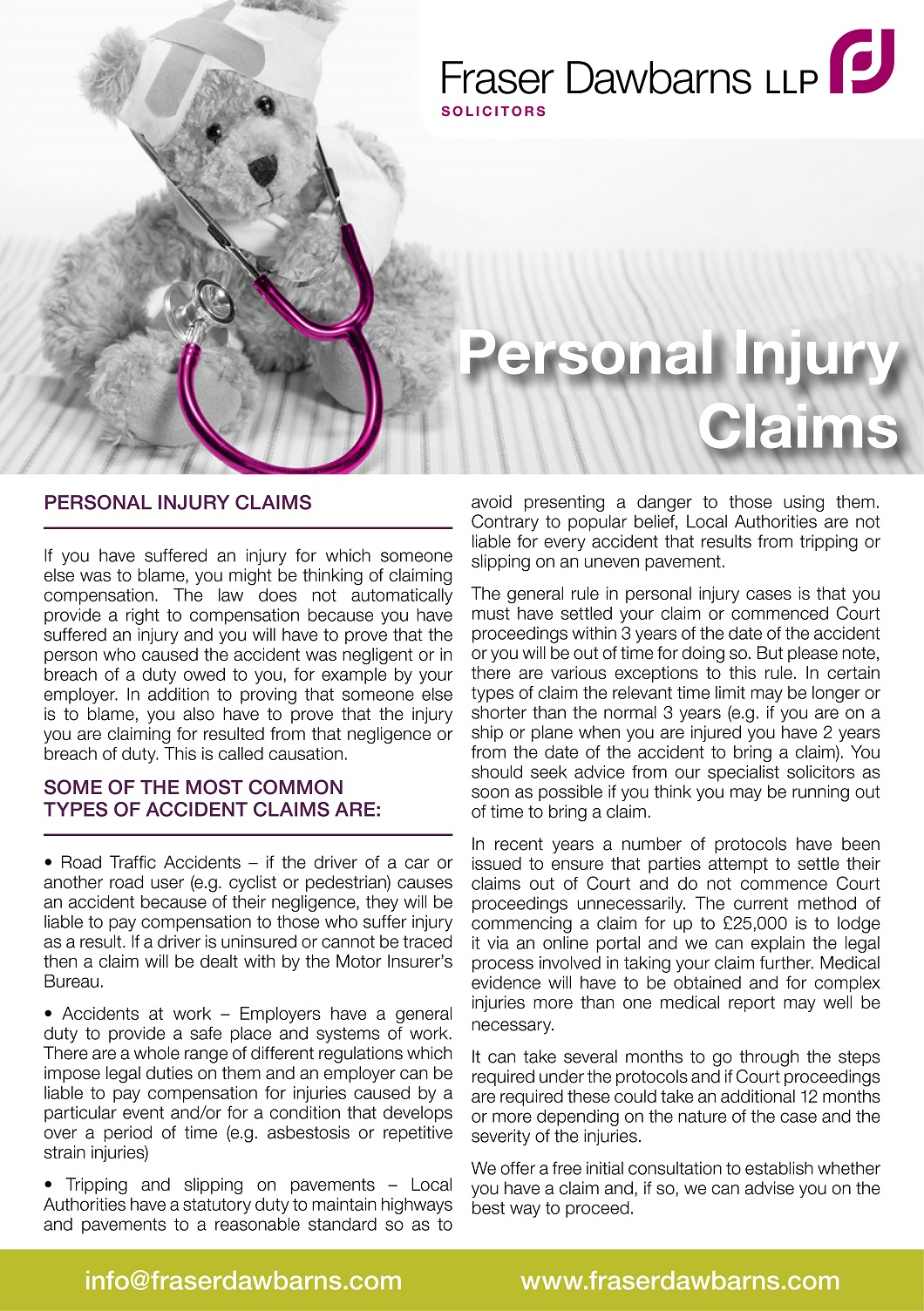Personal Injury Claims (Leaflet)
Personal Injury Claims
If you have suffered an injury for which someone else was to blame, you might be thinking of claiming compensation. The law does not automatically provide a right to compensation because you have suffered an injury and you will have to prove that the person who caused the accident was negligent or in breach of a duty owed to you, for example by your employer.
In addition to proving that someone else is to blame, you also have to prove that the injury you are claiming for resulted from that negligence or breach of duty. This is called causation.
Some of the Most Common Types of Accident Are:
Road Traffic Accidents
If the driver of a car or another road user (e.g. cyclist or pedestrian) causes an accident because of their negligence, they will be liable to pay compensation to those who suffer injury as a result. If a driver is uninsured or cannot be traced then a claim will be dealt with by the Motor Insurer’s Bureau.
Accidents at work
Employers have a general duty to provide a safe place and systems of work. There are a whole range of different regulations which impose legal duties on them and an employer can be liable to pay compensation for injuries caused by a particular event and/or for a condition that develops over a period of time (e.g. asbestosis or repetitive strain injuries)
Tripping and slipping on pavements
Local Authorities have a statutory duty to maintain highways and pavements to a reasonable standard so as to avoid presenting a danger to those using them. Contrary to popular belief, Local Authorities are not liable for every accident that results from tripping or slipping on an uneven pavement.
The general rule in personal injury cases is that you must have settled your claim or commenced Court proceedings within 3 years of the date of the accident or you will be out of time for doing so. But please note, there are various exceptions to this rule. In certain types of claim the relevant time limit may be longer or shorter than the normal 3 years (e.g. if you are on a ship or plane when you are injured you have 2 years from the date of the accident to bring a claim). You should seek advice from our specialist solicitors as soon as possible if you think you may be running out of time to bring a claim.
In recent years a number of protocols have been issued to ensure that parties attempt to settle their claims out of Court and do not commence Court proceedings unnecessarily. The current method of commencing a claim for up to £25,000 is to lodge it via an online portal and we can explain the legal process involved in taking your claim further. Medical evidence will have to be obtained and for complex injuries more than one medical report may well be necessary. It can take several months to go through the steps required under the protocols and if Court proceedings are required these could take an additional 12 months or more depending on the nature of the case and the severity of the injuries.
We offer a free initial consultation to establish whether you have a claim and, if so, we can advise you on the best way to proceed.
There are several ways to fund a claim for personal injury. In the vast majority of cases you will not be able to get legal aid to claim compensation for a personal injury. If do not have an insurance policy or trade union membership we may offer to enter into a Conditional Fee Agreement (often known as a ‘no win no fee’ agreement) to fund your claim.
Our Services
If we are satisfied that your claim has sufficient prospects of success we will offer you a Conditional Fee Agreement. If your case succeeds we will recover the majority of our costs from your opponent and if your case fails we will not charge you for our services. Following a change in the law in 2013, the success fee element of the agreement is paid from your damages. To offset this, injury damages have been increased by 10% across the board We usually recommend that you take out an insurance policy in conjunction with the Conditional Fee Agreement to ensure that you are covered against any risk of having to pay your opponent’s costs if you lose. The premium is not payable unless and until the claim succeeds and is also paid from damages.
To help us decide whether you have a claim we will need to know:
- The date of the accident and where and how the accident happened
- Details of your injuries, a medical diagnosis and treatment received
- Proof of any financial expenses and loss of earnings that have occurred as a result of the accident
- Any documents that will help to prove your claim
We will also need to see:
- Any documents relating to insurance policies you have to check whether these will cover the legal costs of your claim.
- Any details of membership of a trade union as this may entitle you to free legal representation.
We will tell you what we think the value of your claim is and as the claim proceeds we may ask you to give an indication of the level of compensation that you are prepared to accept. If your opponent denies they are liable for your injuries or your claim cannot be settled for a fair amount then we will advise you on whether to start court proceedings. The thought of going to Court may be daunting but if your claim reaches this stage we will explain to you precisely what to expect.
Although personal injury law is complicated our solicitors can help make the process straightforward. This information sheet is not intended as a substitute for taking advice on the circumstances of a particular claim. If you wish to discuss your claim with us please ask for an appointment with our solicitors specialising in personal injury claims.
Why Choose Fraser Dawbarns?
- Direct access to your own dedicated lawyer
- Fixed fee initial consultation; free for personal injury claims
- Full range of legal services
- Clear prices & no hidden costs
Read our Other Services Leaflets Here
Fraser Dawbarns offers a wide range of services to our clients, a selection of which are detailed in the leaflets below. Hard copies are available from the reception of each of our offices. If you would like to find out more about our legal services and how we can help you, please browse the leaflets below.
- Administration of Estates
- Advice for the Elderly
- Building Disputes
- Buying or Selling an Established Business
- Buying, Selling and Remortgaging
- Employment Law for Employers
- Employment Law for Employees
- Family Matters
- Fixed Fee Divorce
- Land Registration
- Leasing Land and Commercial Property
- Legal Disputes
- Living Together (Cohabitation) Agreements
- Making A Will
- Powers of Attorney
- Pre and Post Nuptial Agreements
- Setting Up a Business
- Terms and Conditions of Business
- Welcome to Fraser Dawbarns
Related Articles
Recommended By The Legal 500 Directory*
*We are recommended for the following practice areas: Corporate and Commercial, Debt Recovery, Employment, Personal Injury: Claimant, Agriculture and Estates, Contentious Trusts and Probate, Family, Personal Tax, Trusts and Probate & Commercial Property.
ServicesContact

















